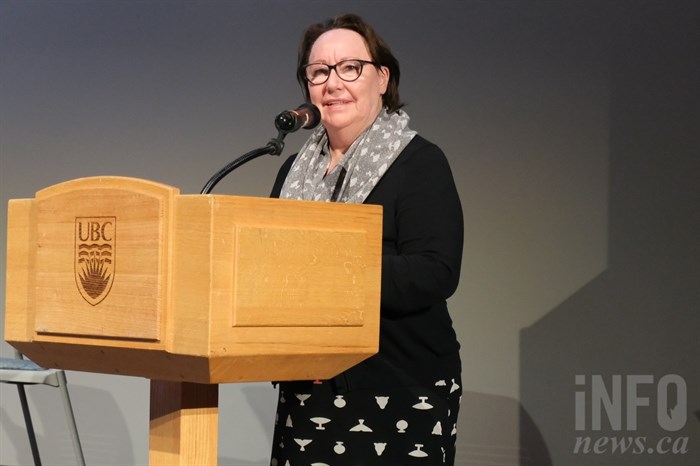
Nobel Peace Prize nominee Sheila Watt-Cloutier speaks at the Community Resilience in a Changing Climate event at UBC Okanagan, Feb. 25.
(CARLI BERRY - WEEKEND EDITOR / iNFOnews.ca)
February 29, 2020 - 5:00 AM
A Nobel Peace Prize-nominee and environmentalist has a dire message for the Central Okanagan about the impact of climate change on Arctic people.
Sheila Watt-Cloutier addressed an audience of roughly 200 people during the Building Community Resilience in a Changing Climate event at UBC Okanagan, Feb. 26.
The presentation also focused on how different areas of the Okanagan may be affected, pulling from the recent Okanagan Valley’s Climate Projections Report, and included a local expert panel.
READ MORE: Climate change projections report has a little good news for the Okanagan
Born and raised in northern Quebec, the Inuit activist said Inuit culture is intertwined with the ice, snow and weather.
Climate change not only creates an imbalance within Earth’s natural cycle, “the ice and snow and cold for us is mobility and transportation,” she said, adding that when the ice conditions become precarious, it becomes a safety issue and concern for Inuit culture, education and health.
Historical traumas, including forced relocations, residential schools, which Watt-Cloutier attended, and the decline of the sealing industry have greatly impacted her people, she said, and a warming climate will only increase the Inuit dependency on government resources.
“It’s really about our very right to exist as Indigenous people,” she said. “That ice is our university in many ways.”
The arctic is the world’s air conditioner, she said. The climate change issue needs to be reframed from a human rights perspective, so people will develop a greater understanding of its impact on people.
“What happens in the Arctic does not stay in the Arctic. Everything is impacted and everything is connected,” she said.
In the Okanagan Valley, according to the climate change report, more rain in the spring will increase flooding risks, and dryer, hotter summers will increase wildfire risks.
The report can be found online through the Regional District of the Central Okanagan.
To contact a reporter for this story, email Carli Berry or call 250-864-7494 or email the editor. You can also submit photos, videos or news tips to the newsroom and be entered to win a monthly prize draw.
We welcome your comments and opinions on our stories but play nice. We won't censor or delete comments unless they contain off-topic statements or links, unnecessary vulgarity, false facts, spam or obviously fake profiles. If you have any concerns about what you see in comments, email the editor in the link above.
News from © iNFOnews, 2020